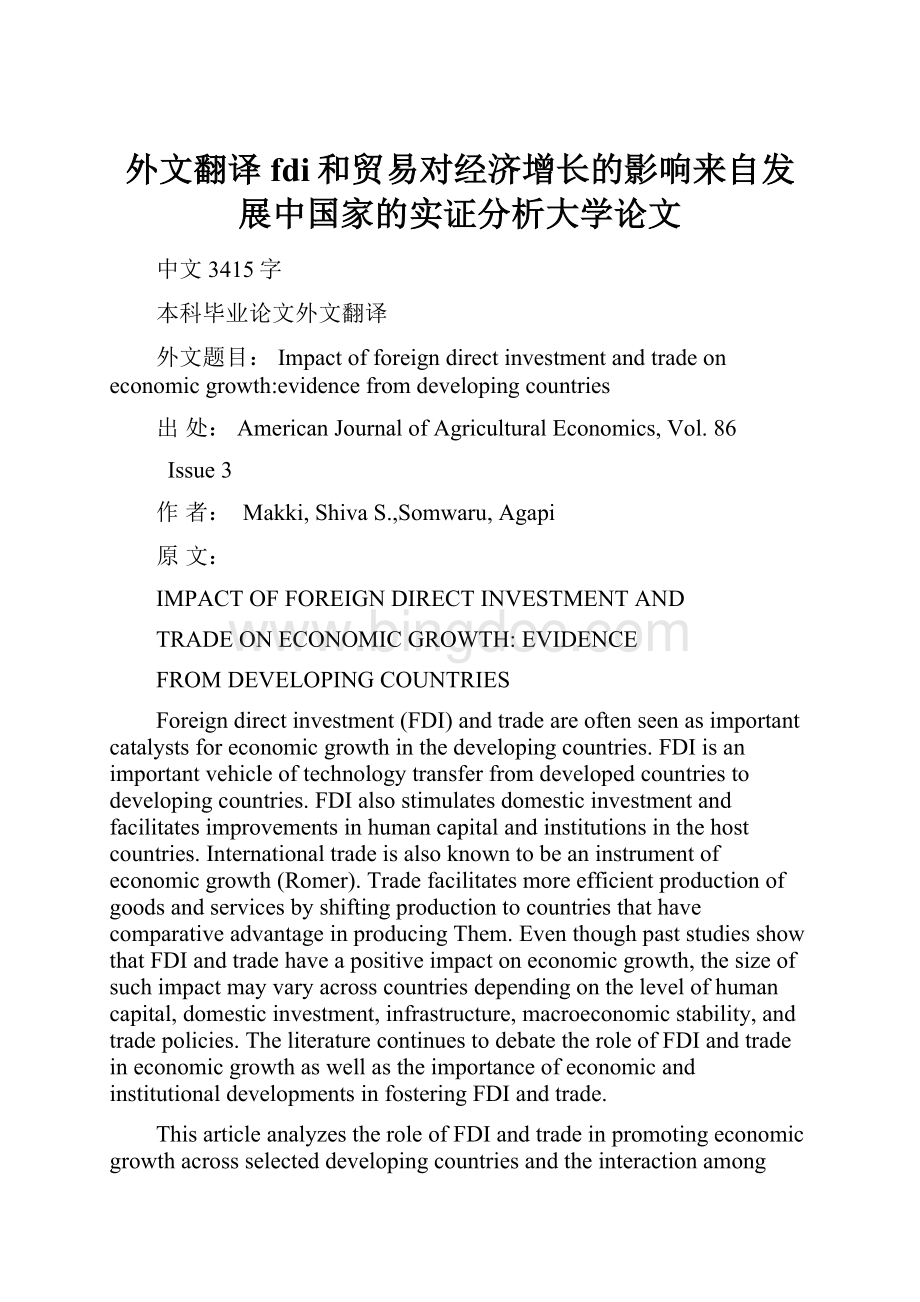外文翻译 fdi和贸易对经济增长的影响来自发展中国家的实证分析大学论文.docx
《外文翻译 fdi和贸易对经济增长的影响来自发展中国家的实证分析大学论文.docx》由会员分享,可在线阅读,更多相关《外文翻译 fdi和贸易对经济增长的影响来自发展中国家的实证分析大学论文.docx(14页珍藏版)》请在冰点文库上搜索。

外文翻译fdi和贸易对经济增长的影响来自发展中国家的实证分析大学论文
中文3415字
本科毕业论文外文翻译
外文题目:
Impactofforeigndirectinvestmentandtradeoneconomicgrowth:
evidencefromdevelopingcountries
出处:
AmericanJournalofAgriculturalEconomics,Vol.86
Issue3
作者:
Makki,ShivaS.,Somwaru,Agapi
原文:
IMPACTOFFOREIGNDIRECTINVESTMENTAND
TRADEONECONOMICGROWTH:
EVIDENCE
FROMDEVELOPINGCOUNTRIES
Foreigndirectinvestment(FDI)andtradeareoftenseenasimportantcatalystsforeconomicgrowthinthedevelopingcountries.FDIisanimportantvehicleoftechnologytransferfromdevelopedcountriestodevelopingcountries.FDIalsostimulatesdomesticinvestmentandfacilitatesimprovementsinhumancapitalandinstitutionsinthehostcountries.Internationaltradeisalsoknowntobeaninstrumentofeconomicgrowth(Romer).TradefacilitatesmoreefficientproductionofgoodsandservicesbyshiftingproductiontocountriesthathavecomparativeadvantageinproducingThem.EventhoughpaststudiesshowthatFDIandtradehaveapositiveimpactoneconomicgrowth,thesizeofsuchimpactmayvaryacrosscountriesdependingonthelevelofhumancapital,domesticinvestment,infrastructure,macroeconomicstability,andtradepolicies.TheliteraturecontinuestodebatetheroleofFDIandtradeineconomicgrowthaswellastheimportanceofeconomicandinstitutionaldevelopmentsinfosteringFDIandtrade.
ThisarticleanalyzestheroleofFDIandtradeinpromotingeconomicgrowthacrossselecteddevelopingcountriesandtheinteractionamongFDI,trade,andeconomicgrowth.Weexaminedatafromsixty-sixdevelopingcountriesoverthelastthreedecades.OurresultssuggestthatFDI,trade,humancapital,anddomesticinvestmentareimportantsourcesofeconomicgrowthfordevelopingcountries.WefindastrongpositiveinteractionbetweenFDIandtradeinadvancingeconomicgrowth.OurresultsalsoshowthatFDIstimulatesdomesticinvestment.ThecontributionofFDItoeconomicgrowthisenhancedbyitspositiveinteractionwithhumancapitalandsoundmacroeconomicpolicies.
MethodologyandData
Oureconometricmodelisderivedfromaproductionfunctioninwhichthelevelofacountry’sproductivitydependsonFDI,trade,domesticinvestment,humancapital,andinitialgrossdomesticproduct(GDP)percapita.Themodelisbasedonendogenousgrowththeory,inthetraditionofBalasubramanyam,Salisu,andSapsfordandBorensztein,Gregorio,andLee,whereFDIcontributestoeconomicgrowthdirectlythroughnewtechnologiesandotherinputsaswellasindirectlythroughimprovinghumancapital,infrastructure,andinstitutions.ToassessempiricallytheeffectsofFDIandtradeoneconomicgrowth,wespecifythefollowingbasicformulation:
g=a+b1FDI+b2TRD+b3HC+b4K+b5G0
+c1FDI
TRD+c2FDI
HC+c3FDI
K
(1)
+d1TRI+d2TX+d3GC+e
wheregisthepercapitaGDPgrowthrate;TRD,thetrade(exportsplusimports)ofgoodsandservices;HC,thestockofhumancapital;K,thedomesticcapitalinvestment;G0,theinitialGDP(initialstock);IRT,theinflationrate;TX,thetaxonincome,profits,andcapitalgainsinthehostcountryexpressedaspercentageofcurrentrevenue;andGCisgovernmentconsumption.ThevariablesFDI,TRD,K,GCaremeasuredasratiostoGDP.WealsoaccountforinteractionofFDIwithtradeanddomesticinvestment,inadditiontohumancapital.PastempiricalstudieshaveindicatedthatFDI,trade,humancapital,anddomesticinvestmenthaveapositiveimpactoneconomicgrowthindevelopingcountries.Weexpecttheestimatedcoefficientsforthesevariablestobepositive.WealsoexpectpositiveinteractionsbetweenFDIandtradeandFDIanddomesticcapitalinvestmentinpromotingeconomicgrowth.
Thestockofhumancapitalinahostcountryiscriticalforabsorbingforeignknowledgeandanimportantdeterminantofwhetherpotentialspilloverswillberealized.WepostulatenotonlyapositiverelationshipbetweenFDIandtheGDPgrowthratebutalsoapositiveinteractionbetweenFDIandhumancapitalinadvancingeconomicgrowth.TheapplicationofadvancedtechnologiesembodiedinFDIrequiresasufficientlevelofhumancapital.Thatis,thehigherthelevelofhumancapitalinahostcountry,thehighertheeffectofFDIonthecountry’seconomicgrowth.OneofthekeyquestionsregardingFDIandeconomicgrowthis:
“WhatistheinteractionbetweenFDIanddomesticinvestment”?
Asarguedbefore,FDIisanimportantvehicleforthetransferofcapital,technology,andknowledgetohostcountries,therebygeneratinghigh-growthopportunities.Inpractice,however,thegrowth-enhancingimpactofFDIdependscriticallyontheabsorptivecapacityofahostcountryandwhetherFDI“crowdsout”itsdomesticinvestment.Thus,animportantquestiontobeaddressedis:
“WhatistheextenttowhichFDIsubstitutesfororcomplementsdomesticinvestment”?
Inourempiricalmodel,weincludeFDIanddomesticinvestmentseparatelyaswellasaninteractiontermbetweenFDIanddomesticinvestment(FDI
K).ApositivecoefficientfortheinteractiontermwouldsuggestthatFDIanddomesticinvestment(K)reinforce(complement)eachotherinadvancingeconomicgrowth.TheinitialGDP,measuredintermsofconstantU.S.dollars,controlsforpreexistingeconomicandinstitutionalconditionsinthehosteconomy.WeexpecttheinitialGDP(expressedinlogarithms)tobenegativelyrelatedwithGDPgrowthrates.Theinflationrateisakeyindicatoroffiscalandmonetarypoliciesofacountry.Alowerinflationrateshouldmeanabetterclimateforinvestment,trade,and,therefore,economicgrowth.Governmentconsumptionandtaxonincome,profits,andcapitalgainsareproxiesforinstitutionsandinfrastructureinthehostcountries.SinceourobjectiveistoquantifytheeffectsofFDIandtradeoneconomicgrowth,wefocusondevelopingCountries.
DataforouranalysisareobtainedfromtheWorldDevelopmentIndicators(WDI)database.However,welimitouranalysisto1971through2000becausetheflowofFDItomostdevelopingcountriesbeganin1970s.Allvariablesrepresenttheaverageoverthefollowingdecades:
1971–1980,1981–1990,and1991–2000.
Weestimateasystemofthreeequations,wherethedependentvariablesarethemeanvaluesofpercapitaGDPgrowthratesineachdecade.Weestimatethesystemofequationsusingtheseeminglyunrelatedregression(SUR)methodaswellasinstrumentalvariable(three-stageleastsquares,TSLS)approach.TheSURestimationallowsfordifferenterrorvariancesineachequationandforcorrelationoftheseerrorsacrossequations,whiletheinstrumentalvariabletechniqueallowsustoovercomepotentialbiasesinducedbyendogeneityproblemsbetweenFDIandeconomicgrowth.
EmpiricalResults
ThepurposeofourempiricalinvestigationistoanalyzetheeffectsofFDIandtradeoneconomicgrowthandtoexaminehowFDIinteractswithtrade,humancapital,anddomesticinvestmentinadvancingeconomicgrowthindevelopingcountries.WecontrolforpreexistingeconomicconditionsbyincludinginitialGDPasoneoftheexplanatoryvariables.Wealsoaccountfordifferencesinmacroeconomicpoliciesinthehostcountriesbyincludingvariables,suchasinflationrate,taxburden,andgovernmentconsumption.
Table1presentstheeconometricresults.Regressions1.1,1.2,and1.3,differentvariantsofequation
(1)aboveareestimatedusingtheSURmethod.Regression1.1isourbasicspecificationwithexplanatoryvariablesofFDI,trade,humancapital,domesticinvestment,andinitialGDP.Regression1.2extends1.1toincludeinteractionofFDIwithtrade,humancapital,anddomesticinvestment.Regression1.3buildsonregression1.2bycontrollingforinflationrate,taxburden,andgovernmentconsumption.Ourresultsshowthatmostcoefficientshavetheexpectedsigns,particularlyinspecification1.3.TheestimatedR2aregenerallylowbutreasonablegiventhecrosssectionalnatureofthedataused.
Regression1.1revealsthatFDIandtradehaveapositiveimpactoneconomicgrowthaftercontrollingforhumancapital,domesticinvestment,andinitialincome.TheestimatedcoefficientforFDIispositiveandstatisticallysignificantwhiletheestimatedcoefficientfortradeisnotstatisticallysignificant.SincethecoefficientofFDIislargerthanthecoefficientoftrade,itindicatesthedifferentialimpactofFDIinthehostcountry’seconomicgrowth.Thecoefficientforhumancapitalispositive,implyingthathumancapitalcontributespositivelytoeconomicgrowth(significantonlyataconfidencelevelof88%).Thecoefficientsfordomesticinvestmentandinitialincomearenotstatisticallysignificant.IncludinginteractionsbetweenFDIandtrade,FDIandhumancapital,andFDIanddomesticinvestmentnotonlyimprovestheoverallperformanceoftheestimationbutalsoallowsusto
capturetheirinteractioneffectsoneconomicgrowth.Inregression1.2,theinteractionofFDIandtradeyieldsapositiveandstatisticallysignificantcoefficientwhiletheeffectsofFDIandtrade,bythemselves,arepositivebutnotstatisticallysignificant.Regression1.2alsorevealsthattheFDIinteractspositivelywithdomesticinvestmentinadvancingeconomicgrowth.Theestimatedcoefficientfordomesticinvestmentispositiveandstatisticallysignificantataconfidencelevelof90%.TheestimatedcoefficientsindicatethathostcountriesbenefitpositivelybothfromFDI,itself,andthroughFDI’spositiveinteractionwithtradeanddomesticinvestment.TheinteractionbetweenFDIandhumancapital,althoughpositive,isnotstatisticallysignificant.Regression1.3includesadditionalvariablestocontrolformacroeconomicpoliciesandinstitutionalstabilitythatcouldhaveasignificantimpactonFDIandtradeand,thus,oneconomic